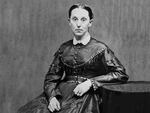
Abigail Scott Duniway
The Oregon Historical Society
In an era when women were, in the words of Susan B. Anthony, "political slaves," Abigail Scott Duniway (1834-1915) rose from quite ordinary beginnings as an Illinois farm girl to become a nationally famed champion of women's suffrage, as well as a significant author and publisher. Duniway was a true pioneer or "path breaker," known for her long and tireless efforts for women's suffrage and women's rights and as one of relatively few female newspaper editors and publishers of her time.
At the age of 17, Duniway traveled with her family overland from Illinois to Oregon by ox-drawn wagon. It was an arduous journey for the Scott party. There were deaths from disease and deaths from drowning. Cholera was epidemic that year, and before they reached Oregon, both Duniway's mother and youngest brother had perished. It was also a formative experience for Duniway. Appointed scribe by her father, she kept a journal of the migration and filled it with expressions of joy and wonder at the magnificent landscapes they traversed, as well as with heartfelt sorrow. Duniway's experiences along the Oregon Trail surfaced time and again in her writing, first in a fictionalized account of the trip, Captain Gray's Company, and later in her many serialized novels which recount tales of strong pioneer women.
After arriving in Oregon, Duniway became a schoolteacher and then entered upon a life as a pioneer farm wife. When her husband, Ben, suffered financial setbacks and was later injured in an accident, Duniway set out to support the family, which by 1869 included six children. She found that, as a woman, her opportunities were severely limited. After another stint at teaching, an occupation that paid women only a fraction of what it paid men, she built up a successful millinery business. But these were only preludes to the discovery of her true vocation — that of relentless campaigner for equal rights.
In 1871, Duniway began publishing The New Northwest, a weekly newspaper devoted to promoting not just suffrage, but an entire agenda of women's issues. At the time the journal commenced publication, married women did not even have the right to ownership of their own wardrobes. Under the mentorship of the far more experienced Susan B. Anthony, who visited the West Coast and traveled through Oregon and Washington with Duniway at this time, the newly established publisher learned the ins and outs of politics and went on to become a national as well as local leader of the women's movement.
One of Duniway's most treasured goals was to achieve suffrage victories in the three states she designated as her "chosen bailiwick." These were Oregon, Washington and Idaho — the states that had comprised the old Oregon Country. Despite staunch opposition from some of the most influential men in Oregon, including Duniway's own brother and long-time editor of the Portland Oregonian, Harvey Scott, these victories came to pass. Idahoan women won the vote in 1896, followed by Washingtonians in 1910. After a number of early near-wins, Oregonians finally achieved victory in 1912, eight years in advance of the passage of the national amendment.
Hailed as a noted campaigner, writer and editor, Duniway was also a vibrant and compelling presence on the lecture platform. She traveled extensively in support of the movement and was a featured speaker at local rallies as well as at national suffrage association meetings, and received complimentary reviews of her powers as a public speaker from a wide variety of sources.
By 1912, when Oregon issued its Equal Suffrage Proclamation, Duniway had spent over 40 years directing her efforts towards alleviating a wide variety of the ills that plagued women. Her relentless work for the cause gave her a near legendary status. She was the first woman registered to vote in Oregon. When the Lewis and Clark Centennial was celebrated in Portland in 1905, it featured an "Abigail Scott Duniway Day," and contemporaries honored her as the quintessential "pioneer mother," as well as the "Mother of Woman Suffrage."
Despite her lifetime of accomplishments and contributions to Oregon history, Abigail Scott Duniway remains a relatively obscure figure to many Oregonians. Although she is Oregon's representative in the Women's Hall of Fame and an elementary school and a park have been named for her in Portland, Duniway has no formal monument to her memory and legacy.
Duniway died in Portland, Oregon in October 1915 at the age of 81.
Adapted from the text of the "Feminist Voices and Visions" exhibit, scripted by Debra Shein, Idaho State University, and produced by University of Oregon Libraries, Special Collections.
Resources
Books
Rebel for Rights: Abigail Scott Duniway by Ruth Barnes Moynihan. 1983
Yours for Liberty by Jean M. Ward and Elaine A Maveety. 2000
Sowing Good Seeds, The Northwest Suffrage Campaigns of Susan B. Anthony by G. Thomas Edwards. 1990
Edna & John: A Romance of Idaho Flat by Abigail Scott Duniway. 2000
Broadcast Date: October 23, 2006